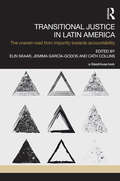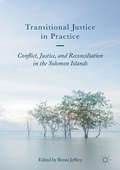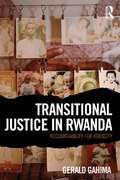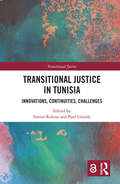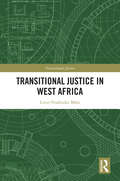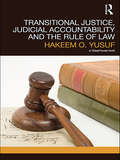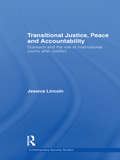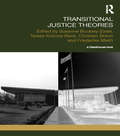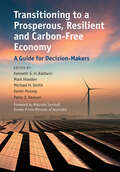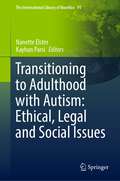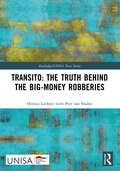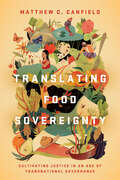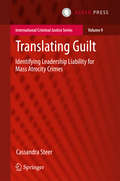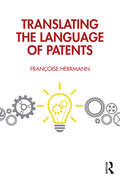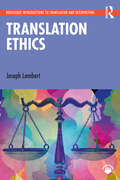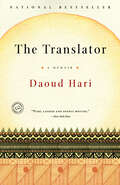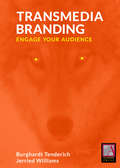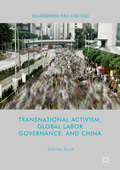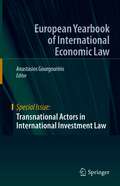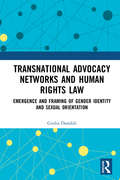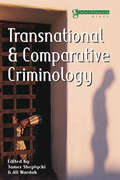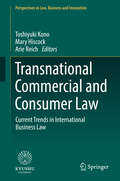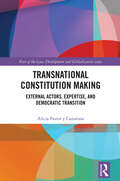- Table View
- List View
Transitional Justice in Latin America: The Uneven Road from Impunity towards Accountability
by Elin Skaar Jemima Garcia-Godos Cath CollinsThis book addresses current developments in transitional justice in Latin America – effectively the first region to undergo concentrated transitional justice experiences in modern times. Using a comparative approach, it examines trajectories in truth, justice, reparations, and amnesties in countries emerging from periods of massive violations of human rights and humanitarian law. The book examines the cases of Argentina, Brazil, Chile, Colombia, Guatemala, El Salvador, Paraguay, Peru and Uruguay, developing and applying a common analytical framework to provide a systematic, qualitative and comparative analysis of their transitional justice experiences. More specifically, the book investigates to what extent there has been a shift from impunity towards accountability for past human rights violations in Latin America. Using ‘thick’, but structured, narratives – which allow patterns to emerge, rather than being imposed – the book assesses how the quality, timing and sequencing of transitional justice mechanisms, along with the context in which they appear, have mattered for the nature and impact of transitional justice processes in the region. Offering a new approach to assessing transitional justice, and challenging many assumptions in the established literature, this book will be of enormous benefit to scholars and others working in this area.
Transitional Justice in Post-Communist Romania
by Lavinia Stan"A close examination of an understudied European Union member state such as Romania reveals that, since 1989, postcommunist state and non-state actors have adopted a wide range of methods, processes, and practices of working through the communist past. Both the timing and the sequencing of these transitional justice methods prove to be significant in determining the efficacy of addressing and redressing the crimes of 1945 to 1989. In addition, there is evidence that some of these methods have directly facilitated the democratization process, while the absence of other methods has undermined the rule of law. This is the first volume to overview the complex Romanian transitional justice effort, by accessing secret archives and investigating court trials of former communist perpetrators, lustration, compensation and rehabilitation, property restitution, the truth commission, the rewriting of history books, and unofficial truth projects. It details the political negotiations that have led to the adoption of relevant legislation and assesses these processes in terms of their timing, sequencing, and impact on democratization"--
Transitional Justice in Practice: Conflict, Justice, and Reconciliation in the Solomon Islands
by Renée JefferyThis book examines the practice of transitional justice in the Solomon Islands from the period of the ‘The Tensions’ to the present. In late 1998, the Solomon Islands were plunged into a period of violent civil conflict precipitated by a complex web of grievances, injustices, ethnic tensions, and economic insecurities. This conflict dragged on until the middle of 2003, leaving an estimated 200 people dead and more than 20 000 displaced from their homes. In the time that has elapsed since the end of The Tensions, numerous—at times incompatible—approaches to transitional justice have been implemented in the Solomon Islands. The contributors to this volume examine how key global trends and debates about transitional justice were played out in the Solomon Islands, how its key mechanisms were adapted to meet the specific demands of post-conflict justice in this local context, and how well its practices and processes fulfilled their perceived functions.
Transitional Justice in Rwanda: Accountability for Atrocity
by Gerald GahimaTransitional Justice in Rwanda: Accountability for Atrocity comprehensively analyzes the full range of the transitional justice processes undertaken for the Rwandan genocide. Drawing on the author’s extensive professional experience as the principal justice policy maker and the leading law enforcement officer in Rwanda from 1996-2003, the book provides an in-depth analysis of the social, political and legal challenges faced by Rwanda in the aftermath of the genocide and the aspirations and legacy of transitional justice. The book explores the role played by the accountability processes not just in pursuing accountability but also in shaping the reconstruction of Rwanda’s institutions of democratic governance and political reconciliation. Central to this exploration will be the examination of whether or not transitional justice in Rwanda has contributed to a foundational rule of law reform process. While recognizing the necessity of pursuing accountability for mass atrocity, the book argues that a maximal approach to accountability for genocide may undermine the promotion of core objectives of transitional justice. Taking on one of the key questions facing practitioners and scholars of transitional justice today, the book suggests that the pursuit of mass accountability, particularly where socio-economic resources and legal capacity is limited, may destabilize the process of rule of law reform, endangering core human rights norms. Moreover, the book suggests that pursuing a strategy of mass accountability may undermine the process of democratic transition, particularly in a context where impunity for crimes committed by the victors of armed conflicts persists. Highlighting the ongoing democratic deficit in Rwanda and resulting political instability in the Great Lakes region, the book argues that the effectiveness of transitional justice ultimately hinges on the nature and success of political transition.
Transitional Justice in the Asia-Pacific
by Renée Jeffery Hun Joon KimHow to address the human rights violations of previous regimes and past periods of conflict is one of the most pressing questions facing governments and policy makers today. New democracies and states in the fragile post-conflict peace-settlement phase are confronted by the need to make crucial decisions about whether to hold perpetrators of human rights violations accountable for their actions and, if so, how to best achieve that end. This is the first book to examine the ways in which states and societies in the Asia-Pacific region have navigated these difficult waters. Drawing together several of the world's leading experts on transitional justice with Asia-Pacific regional and country specialists it provides an overview of the processes and practices of transitional justice in the region as well as detailed analysis of the cases of Cambodia; Sri Lanka; Aceh, Indonesia; South Korea; the Solomon Islands; and East Timor.
Transitional Justice in Tunisia: Innovations, Continuities, Challenges
by Simon Robins Paul GreadyThis book engages comprehensively with the dynamics of the transitional justice process in Tunisia and its mechanisms, elaborating lessons for transitional justice practice globally. Grounded in new empirical material as well as a broader awareness of transitional justice, this book provides a thorough assessment of transitional justice in Tunisia. Beyond an overview of the process, it critically engages with key questions such as the extent to which the process articulated global contemporary practice, such as liberal state-building and narrow conceptions of justice as civil-political rights, and to which it generated novel approaches at odds with the mainstream that can inform global practice. The book examines how the transitional justice process in Tunisia has been contextualised and made relevant to the nation’s circumstances and needs. It looks at innovation at the level of formal mechanisms and at the dynamics of mobilisation and contestation surrounding transitional justice both from civil society organisations and victims’ groups. Bringing together analysis from legal scholars, social scientists as well as activists and practitioners, the book challenges the legalism of transitional justice discourse globally, engendering a dialogue between these legal and judicial approaches on the one hand and alternative, more diverse and radical approaches to justice on the other, in order to both deal with the past and to address ongoing injustice. This first book in English to address the dynamics and mechanisms of the transitional justice process in Tunisia will appeal to students and scholars of transitional justice, human rights, peacebuilding, conflict and peace studies, development, and security studies, as well as policymakers and practitioners in these fields, and others with interests in Middle Eastern studies.
Transitional Justice in West Africa
by Linus Nnabuike MaluThis book explores the challenges of transitional justice in West Africa, specifically how countries in the region have dealt with transitional justice problems in the last 30 years (1990–2020), and how they have managed the process. Using comparative, historical, and legal analyses it examines the politics of justice after violent conflicts in West Africa, the major transitional justice mechanisms established in the region, and how countries have used these institutions to address injustice and the pains of war in some West African countries. The book examines how transitional justice mechanisms have contributed to victims’ rights, reconciliation, and peace in transitional societies, and whether transitional justice mechanisms deployed in West Africa were suitable or ill-fitted, and the politics of deploying them. The book is addressed to a wide audience: policymakers, and graduate and post-graduate students of transitional justice, conflict resolution, peace studies, conflict transformation, international criminal law, law and similar subjects. This book will be of great value to academics and researchers, as well as lecturers in tertiary institutions offering relevant courses; legal practitioners; peace practitioners/NGOs; and those working in the field of transitional justice and human rights.
Transitional Justice, Judicial Accountability and the Rule of Law
by Hakeem O. YusufTransitional Justice, Judicial Accountability and the Rule of Law addresses the importance of judicial accountability in transitional justice processes. Despite a general consensus that the judiciary plays an important role in contemporary governance, accountability for the judicial role in formerly authoritarian societies remains largely elided and under-researched. Hakeem O. Yusuf argues that the purview of transitional justice mechanisms should, as a matter of policy, be extended to scrutiny of the judicial role in the past. Through a critical comparative approach that cuts through the transitioning experiences of post-authoritarian and post-conflict polities in Latin America, Asia, Europe and Africa, the book focuses specifically on Nigeria. It demonstrates that public accountability of the judiciary through the mechanism of a truth-seeking process is a necessary component in securing comprehensive accountability for the judicial role in the past. Transitional Justice, Judicial Accountability and the Rule of Law further shows that an across-the-board transformation of state institutions – an important aspiration of transitional processes – is virtually impossible without incorporating the third branch of government, the judiciary, into the accountability process.
Transitional Justice, Peace and Accountability: Outreach and the Role of International Courts after Conflict (Contemporary Security Studies)
by Jessica LincolnThe book looks at the outreach and communication strategies employed by internationalised courts to try to understand the wider impact of international justice. This book critically examines the role of outreach within international justice focusing specifically on the role of outreach at the Special Court for Sierra Leone (SCSL). It contributes to understanding of the relationship between international courts and the affected populations; an area currently underexplored and little understood. The assumption that justice brings peace underpins much of the thinking, and indeed action, of international justice, yet little is known if this is actually the case. Significant questions surrounding the link between peace and justice remain: do trials deter would-be war criminals; is justice possible for the most heinous crimes; can international justice replace local justice? This book explores these questions in relation to recent developments in international justice that have both informed and shaped the creation of the hybrid tribunal in Sierra Leone. Through empirical analysis, Transitional Justice, Peace and Accountability, answers these questions and provides an insight into individual and community perceptions of international justice. This book will be of much interest to students of transitional justice, war crimes, peace and conflict studies, human rights, international law, and IR in general.
Transitional Justice Theories
by Susanne Buckley-Zistel Teresa Koloma Beck Christian Braun Friederike MiethTransitional Justice Theories is the first volume to approach the politically sensitive subject of post-conflict or post-authoritarian justice from a theoretical perspective. It combines contributions from distinguished scholars and practitioners as well as from emerging academics from different disciplines and provides an overview of conceptual approaches to the field. The volume seeks to refine our understanding of transitional justice by exploring often unarticulated assumptions that guide discourse and practice. To this end, it offers a wide selection of approaches from various theoretical traditions ranging from normative theory to critical theory. In their individual chapters, the authors explore the concept of transitional justice itself and its foundations, such as reconciliation, memory, and truth, as well as intersections, such as reparations, peace building, and norm compliance. This book will be of particular interest for scholars and students of law, peace and conflict studies, and human rights studies. Even though highly theoretical, the chapters provide an easy read for a wide audience including readers not familiar with theoretical investigations.
Transitioning to a Prosperous, Resilient and Carbon-Free Economy: A Guide for Decision-Makers
by Baldwin, Kenneth G. H. Mark Howden Michael H. Smith Karen Hussey Peter J. DawsonThis book is a comprehensive manual for decision-makers and policy leaders addressing the issues around human caused climate change, which threatens communities with increasing extreme weather events, sea level rise, and declining habitability of some regions due to desertification or inundation. The book looks at both mitigation of greenhouse gas emissions and global warming and adaption to changing conditions as the climate changes. It encourages the early adoption of climate change measures, showing that rapid decarbonisation and improved resilience can be achieved while maintaining prosperity. The book takes a sector-by-sector approach, starting with energy and includes cities, industry, natural resources, and agriculture, enabling practitioners to focus on actions relevant to their field. It uses case studies across a range of countries, and various industries, to illustrate the opportunities available. Blending technological insights with economics and policy, the book presents the tools decision-makers need to achieve rapid decarbonisation, whilst unlocking and maintaining productivity, profit, and growth.
Transitioning to Adulthood with Autism: Ethical, Legal and Social Issues (The International Library of Bioethics #91)
by Nanette Elster Kayhan ParsiThis book offers the first ever book-length treatment of the topic of transitioning from adolescence to adulthood with autism and the attendant ethical, legal and social issues for the individual as well as caregivers and professionals. It features experts in a variety of areas (law, bioethics, philosophy, pediatrics, neurology, medicine, psychology, special education, social work, employment, civic participation, social media) who provide commentary on these areas and the relevant ethical/legal/social challenges young autistic adults face in these different areas. This is an indispensable read for educators, therapists, and other professionals who work in transition with young autistic adults.
Transito: The Truth behind the Big-Money Robberies (Routledge/UNISA Press Series)
by Hennie Lochner Peet van StadenThis book is an important resource for the cash in transit (CIT) companies, financial services industries and criminal justice system. With one of the authors having used convicts of CIT crimes as participants for a PhD study, he solicited data from the lived experiences of CIT robbers that reveal their modus operandi, which is crucial to combat these robberies. The authors reveal how CIT robbers meticulously plan and execute their ambushes collaborating with the sophisticated network of accomplices. The book is thus a timely publication that provides information to combat CIT crimes.
Translating Food Sovereignty: Cultivating Justice in an Age of Transnational Governance
by Matthew C. CanfieldIn its current state, the global food system is socially and ecologically unsustainable: nearly two billion people are food insecure, and food systems are the number one contributor to climate change. While agro-industrial production is promoted as the solution to these problems, growing global "food sovereignty" movements are challenging this model by demanding local and democratic control over food systems. Translating Food Sovereignty accompanies activists based in the Pacific Northwest of the United States as they mobilize the claim of food sovereignty across local, regional, and global arenas of governance. In contrast to social movements that frame their claims through the language of human rights, food sovereignty activists are one of the first to have articulated themselves in relation to the neoliberal transnational order of networked governance. While this global regulatory framework emerged to deepen market logics, Matthew C. Canfield reveals how activists are leveraging this order to make more expansive social justice claims. This nuanced, deeply engaged ethnography illustrates how food sovereignty activists are cultivating new forms of transnational governance from the ground up.
Translating Guilt
by Cassandra SteerThis book seeks to understand how and why we should hold leaders responsible for the collective mass atrocities that are committed in times of conflict. It attempts to untangle the debates on modes of liability in international criminal law (ICL) that have become truly complex over the last twenty years, and to provide a way to identify the most appropriate model for leadership liability. A unique comparative theory of ICL is offered, which clarifies the way in which ICL develops as a patchwork of different domestic criminal law notions. This theory forms the basis for the comparison of some influential domestic criminal law systems, with a view to understanding the policy and cultural reasons for their differences. There is a particular focus on the background of the German law which has influenced the International Criminal Court so much recently. This helps to understand, and seek a solution to, the current impasses in the debates on which model of liability should be applied. An entire chapter of the book is devoted to considering why leaders should be held responsible for crimes committed by their subordinates, from legal, moral and pragmatic perspectives. The moral responsibility of leaders is translated into criminal liability, and the different domestic models of liability are translated to the international context, in such a way as to appeal to advanced students of ICL, academics, and practitioners who want to understand the complexities of leadership liability in international criminal law today and identify the best way to approach it. Cassandra Steer is Executive Director of Women in International Security Canada, and Junior Wainwright Fellow at McGill University, Canada. She holds a Ph. D. in Law from the University of Amsterdam, The Netherlands.
Translating the Language of Patents
by Françoise HerrmannThis book is a guide to translating the language of patents in view of avoiding costly translation errors. Errors that might hinder the examination process for granting patents, or that might make patents undefendable in a context of litigation.The 42 sections of this book each identify different provisions of the law for their relevance to translation. These provisions govern language uses, right down to the use of punctuation. Each of the sections present findings, both in terms of the relevant provisions identified, and their specific significance to translation. Exemplified translations focus on French and English, but when there is a consensus across Intellectual property systems, multilingual parallelism is highlighted. Wherever relevant, provisions of specific rules and regulations are presented and exemplified in the three official languages of the European Patent Office (EPO), English, French, and German and the three official languages of the United Nations World Intellectual Property Organization (WIPO), English, French, and Spanish.Written by an experienced teacher, patent translator, and author of the blog, Patents on the Soles of Your Shoes, this is a rigorously researched, authoritative, and comprehensive guide for all professional translators working on patents, and for students and translators working in legal translation. Accompanying e-resources are available on the Routledge Translation studies portal (routledgetranslationstudiesportal.com) including information on how to use this book in courses.
Translation Ethics (Routledge Introductions to Translation and Interpreting)
by Joseph LambertTranslation Ethics introduces the topic of ethics for students, researchers, and professional translators. Based on a successful course and written by an experienced instructor, the Introduction and nine core chapters offer an accessible examination of a wide range of interlocking topic areas, which combine to form a cohesive whole, guiding students through the key debates. Built upon a theoretical background founded in philosophy and moral theory, it outlines the main contributions in the area and traces the development of thought on ethics from absolutism to relativism, or, from staunchly-argued textual viewpoints to current lines of thought placing the translator as agent and an active – even interventionary – mediator. The textbook then examines the place of ethical enquiry in the context of professional translation, critiquing provision such as codes of ethics. Each chapter includes key discussion points, suggested topics for essays, presentations, or in-class debates, and an array of contextualised examples and case studies. Additional resources, including videos, weblinks, online activities, and PowerPoint slide presentations on the Routledge Translation studies portal provide valuable extra pedagogical support. This wide-ranging and accessible textbook has been carefully designed to be key reading for a wide range of courses, including distance-learning courses, from translation and interpreting ethics to translation theory and practice.
The Translator: A Memoir
by Daoud HariNATIONAL BESTSELLER • A suspenseful and deeply moving memoir that &“lays open the Darfur geocide . . . intimately and powerfully&” (The Washington Post Book World) and shows how one person can make a difference in the world. &“A book of unusually humane power and astounding moral clarity.&”—Kirkus Reviews (starred review) I am the translator who has taken journalists into dangerous Darfur. It is my intention now to take you there in this book, if you have the courage to come with me. Daoud Hari—his friends call him David—is a Zaghawa tribesman and grew up in a village in the Darfur region of Sudan. As a child he saw colorful weddings, raced his camels across the desert, and played games in the moonlight after his work was done. This traditional life shattered in 2003 when helicopter gunships appeared over Darfur&’s villages. Hari was among the hundreds of thousands of villagers attacked and driven from their homes by Sudanese-government-backed militia groups. Though Hari&’s village was burned to the ground, his family decimated and dispersed, he himself escaped, eventually finding safety across the border. Roaming the battlefield deserts on camels, he and a group of his friends helped survivors find food, water, and the way to safety. With his high school knowledge of languages, Hari offered his services as a translatorand guide after international aid groups and reporters arrived. In doing so, he risked his life again and again, for the government of Sudan had outlawed journalists in the region, and death was the punishment for those who aided the &“foreign spies.&” And then, inevitably, his luck ran out and he was captured. . . .The Translator tells the remarkable story of a young man who came face-to-face with genocide—time and again risking his own life to fight injustice and save his people.
Transmedia Branding: Engage Your Audience
by Burghardt Tenderich Jerried Williams Arlene Luck Larry GrossYou're either fully engaged with your audience or you're irrelevant. The choice is yours.What do Chipotle and The Matrix and Intel and Old Spice and The Teenage Mutant Ninja Turtles know that you don't? How have disruptive economics, consumerism, and spreadable media evolved the relationship between brands and their audiences?We've all heard it before -- decreased barriers to entry, increased accessibility to technology, and the ability to virtually connect with experts around the globe have ignited a fiercely competitive battle for eyeballs. In this crowded media environment, how can brands create campaigns that people want to engage with and share with others? What mistakes do they need to avoid?In Transmedia Branding: Engage Your Audience, Burghardt Tenderich and Jerried Williams traverse the entertainment industry, technology sector, and consumer goods to show the timeless relevance of some of the greatest minds in communications: David Ogilvy, Edward Bernays, Philip Kotler, and Henry Jenkins. They provide a methodology for developing transmedia branding campaigns to engage audiences along with multiple case studies for further insight.The book targets marketing and public relations practitioners, students, academics and anybody interested in the rapidly evolving world of marketing communications and public relations.
Transnational Activism, Global Labor Governance, and China
by Sabrina ZajakThis book explores rising labor unrest in China as it integrates into the global political economy. The book highlights the tensions present between China's efforts to internationalize and accept claims to respect freedom of association rights, and its continuing insistence on a restrictive, and often punitive, approach to worker organizations. The author examines how the global labor movement can support the improvement of working conditions in Chinese factories. The book presents a novel multi-level approach capturing how trade unions and labor rights NGOs have mobilized along different pathways while attempting to influence labor standards in Chinese supply chains since 1989: within the ILO, within the European Union, leveraging global brands or directly supporting domestic labor rights NGOs. Based on extensive fieldwork in Europe, the US and China, the book shows that activists, by operating at multiple scales, were on some occasions able to support improvements over time. It also indicates how a politically and economically strong state such as China can affect transnational labor activism, by directly and indirectly undermining the opportunities that organized civil societies have to participate in the evolving global labor governance architecture.
Transnational Actors in International Investment Law (European Yearbook of International Economic Law)
by Anastasios GourgourinisThis book reviews for the first time some of the less frequently addressed actors in international investment law. Traditional studies concerning actors in international investment law have tended to focus on arbitrators, claimant investors and respondent states. This book explores transnational actors, such as UNCITRAL, the EU, international standardizing bodies, domestic and international courts and tribunals, etc., shedding light on their transnational activity and pluralistic role in international investment law.
Transnational Advocacy Networks and Human Rights Law: Emergence and Framing of Gender Identity and Sexual Orientation
by Giulia DondoliThis book asks the fundamental question of how new human rights issues emerge in the human rights debate. To answer this, the book focuses on nongovernmental organizations (NGOs) and on the case study of LGBTI (lesbian, gay, bisexual, transgender and intersex) rights. The work argues that the way in which NGOs decide their advocacy, conceptualise human rights violations and strategically present legal analysis to advance LGBTI human rights shapes the human rights debate. To demonstrate this, the book analyses three data sets: NGO written statements submitted to the United Nations Human Rights Council, NGO oral statements delivered during the Universal Periodic Review and 36 semi-structured interviews with NGO staff. Data are analysed with a combination of quantitative and qualitative approaches to discover what issues are most important for LGBTI networks (issue emergence) and how these issues are framed (issue framing). Along with NGO efficiency in lobbying for the emergence of new human rights standards, the book inevitably discusses important questions related to NGOs’ accountability and democratic legitimacy. The book thus asks whether the right to marry is important for LGBTI advocates working transnationally, because this right is particularly controversial among activists and LGBTI communities, especially in non-Western contexts.
Transnational and Comparative Criminology
by James Sheptyck Ali WardakThis book examines the issues of crime and its control in the twenty-first century - an era of human history where people live in an increasingly interconnected and interdependent world - providing invaluable and first-hand readings for undergraduate and postgradate students.
Transnational Commercial and Consumer Law: Current Trends In International Business Law (Perspectives in Law, Business and Innovation)
by Arie Reich Mary Hiscock Toshiyuki KonoThis book explores current developments in transnational commercial and consumer law. It features essays written by leading experts, many of who have taken part in the negotiation and formulation of the international instruments they discuss here. The contributors look at issues arising from the profound changes that globalization is having on the legal norms governing commercial and consumer transactions, both domestic and transnational. They consider how relations between private actors, state regulators, and national courts are being completely reconfigured. This, in turn, generates pressures for legal harmonization and creates opportunities for new national and transnational legal norms and procedures to develop. The contributions address both the dynamics and the substance of these developments. Topics included are the UNCITRAL Model Law on secured transactions and on cross-border insolvency, the ICC Uniform Customs and Practices of Documentary Credits (UCP 600), and the dispute resolution mechanism and practices of the World Trade Organization. The content was formerly presented as papers at the 18th Biennial Meeting of the International Academy of Commercial and Consumer Law (the International Academy) at Kyushu University, Japan. Overall, this book provides readers with a solid theoretical foundation and strong familiarity with the practice of law and international commerce, offering realistic and practical conclusions.
Transnational Constitution Making: External Actors, Expertise, and Democratic Transition (Law, Development and Globalization)
by Alicia Pastor y CamarasaThis book examines the largely neglected but crucial role of transnational actors in democratic constitution-making.The writing or rewriting of constitutions is usually a key moment in democratic transitions. But how exactly does this take place? Most contemporary comparative constitutional literature draws on the concept of constituent power – the power of the people – to address this moment. But what this overlooks, this book argues, is the important role of external, transnational actors who tend to play a crucial role in the process. Drawing on sociolegal methodologies but informed by new legal realism, this book develops a new theoretical framework for examining the involvement of such actors in constitution-making. Empirically grounded, the book uncovers a more comprehensive picture of how constitution-making unfolds on the ground. Illuminating the power dynamics at play during the legal process, it reveals not only the wide range of external actors involved but also the continuity between decolonisation and post-Cold War constitution-making. This book, the first to provide an in-depth examination of external actor involvement in constitution-making, will appeal to scholars of constitutional law, sociolegal studies, law and development, and transitional justice.
